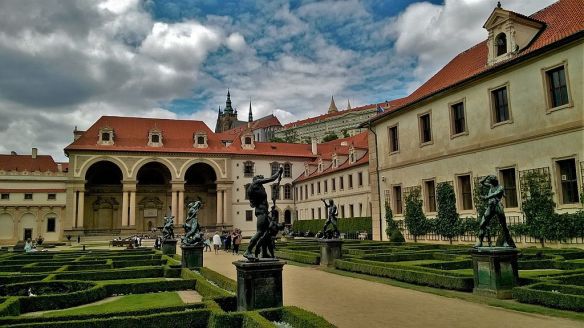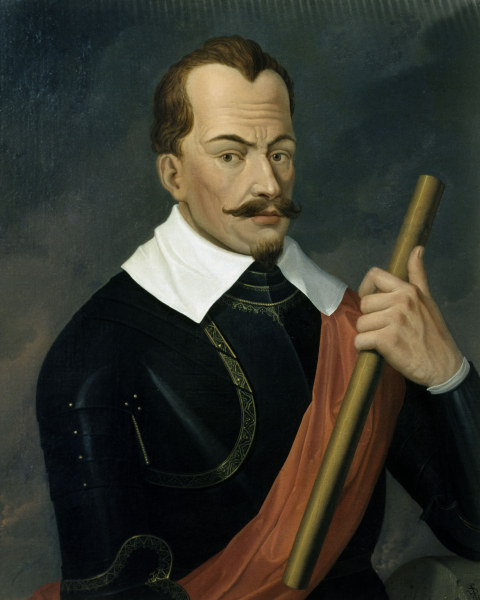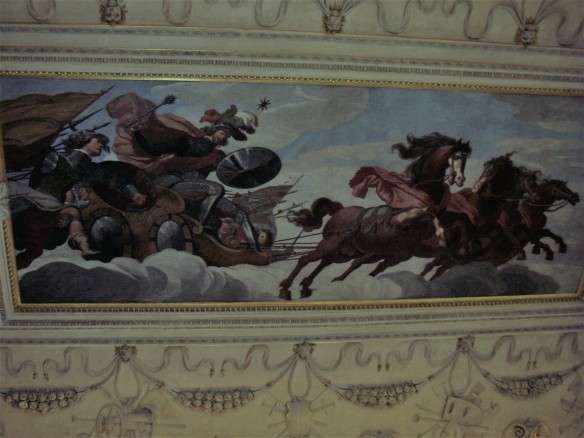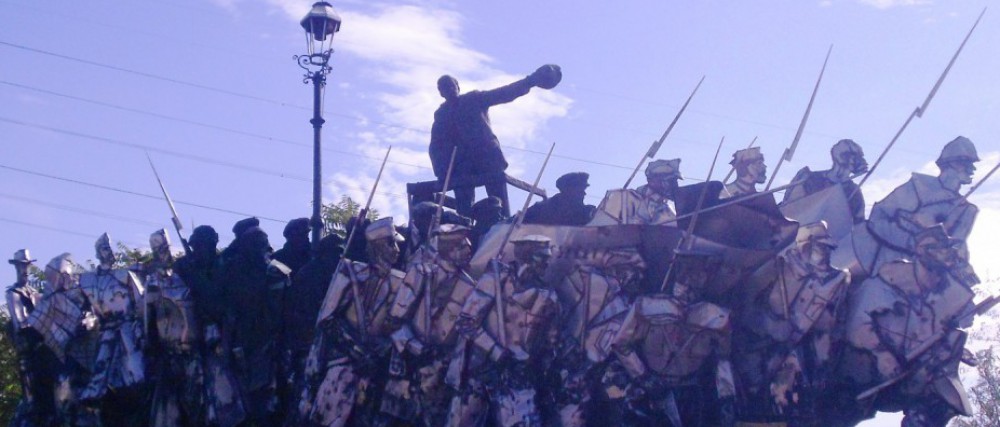I was standing on the eastern edge of Prague Castle looking down at the heart of the Czech capital. I could easily spot the Charles, Legion and Manes Bridges, the Vltava River slowly surged forward with the historic architecture of Prague’s Stare Mesto (Old Town) visible just to the west of it. Below me was the Mala Strana (Lesser Town) with its red roofs and beautiful Baroque architecture. One area of it that I could not help but notice was the Wallenstein Palace. Today it houses the Czech Republic’s Senate, but the palace is most famous for its namesake, Albrecht von Wallenstein. The sight of the palace and its adjacent grounds gave me pause, I felt a strange, menacing fascination. That name Wallenstein meant much more than a palace, it meant power and betrayal, war without end and ultimately murder.
Wallenstein was one of the most famous warlords in what was Europe’s most infamous conflict prior to the 20th century. He brought himself fame and fortune during the Thirty Years’ War, a conflict which caused untold suffering and ravaged Central Europe for much of the first half of the 17th century. He rose to become the supreme commander of the Habsburg Monarchy’s forces before he fell from favor and was assassinated. It was almost impossible for me to separate the man from his fate. Wallenstein’s murder was chilling, but not surprising. More than anything, Wallenstein was dedicated to war and that dedication brought him to a very bloody end on a deadly winter night.

Wallenstein Palace – in Prague’s Mala Strana District (Credit: packare)
A Conversion To Power – Faith In Opportunism
Ambitious, opportunistic and rapacious are all words that aptly describe Albrecht von Wallenstein. His pursuit of power knew no bounds and would eventually lead to his downfall, but it also led him to surmount the circumstances of the world into which he was born. Wallenstein came from a family of poor Bohemian nobility. “Poor” is a relative word though. The Wallenstein family owned a castle and seven villages, but by the standards of Bohemian nobility they were impoverished. Albrecht acquired an excellent education, first at Protestant schools and universities – he was raised Lutheran – then later under the tutelage of Jesuits. Some believe this Jesuit instruction was the main reason for his conversion to Catholicism. This decision would ultimately pay off, as Wallenstein had effectively aligned himself with the Habsburg Monarchy during the Counter-Reformation. Only Catholics could be appointed to positions of power in the monarchy. Whether Wallenstein went through a legitimate conversion is open to question. The conversion was just as likely opportunism.
Judging by his future career, the ends always justified the means. The same went for marriage, as Wallenstein attained much of his initial wealth and power from what would be termed today as marrying into money. In his case, he married into land and lots of it. His first marriage to a widow only lasted five years, but that was because she died and left him with vast landholdings. A decade later, he married the daughter of a count. Her family lands came into his possession as well. After the two marriages, Wallenstein was one of the wealthiest landowners in Bohemia, but that was not enough for him. The more he took, the more he wanted.

Albrecht von Wallenstein (Credit: Anthony Van Dyck)
A Lust For Power – From Egomania To Megalomania
It was not just wealth, but also power which Wallenstein coveted. His wealth was a means to this end. He financed and outfitted an entire regiment to fight in the Thirty Years’ War on behalf of the Habsburg Emperor Ferdinand II. Such was his military prowess that he quickly advanced to the upper echelons of the Emperor’s armed forces. He led troops in a stunning series of triumphs which included victory over Protestant forces at the Battle of White Mountain. After this victory, Wallenstein confiscated landholdings of Protestant nobles in Bohemia. Warfare was paying off handsomely, bringing him power, prestige and incredible riches. His military acumen extended well beyond the battlefield. He developed a system of “war taxes” whereby allies of the Emperor had to help fund the military. Prior to this, armies lived only off the plunder they gained from their martial exploits, now both ally and enemy would fund military expeditions. This system allowed Wallenstein to raise massive numbers of troops for a series of seemingly endless campaigns.
Amid his many glorious victories, Wallenstein failed to see that he was bleeding the population on his own side to death. Civilians became increasingly resentful of his methods. Wallenstein’s troops were notorious for being particularly brutal in their treatment of local populations. At the same time, his growing power was becoming a threat to the Holy Roman Emperor Ferdinand II. The emperor was right to fear Wallenstein. Here was a man whose lust for power and wealth seemed to never be satisfied. Case in point, Wallenstein Palace, where no expense was spared in its construction and furnishing the interior. Wallenstein built it to compete with Prague Castle, which towered just above it. As such, the palace’s Main Hall rivaled the Spanish Hall at the castle in size and splendor. One specific fresco in the Main Hall is particularly expressive of Wallenstein’s megalomania. In the middle ceiling, the fresco portrays Wallenstein as Mars, the God of War. In the past, Mars had been depicted driving a war chariot with three horses. In the ceiling fresco, he is driving four horses. Egomaniacal and vain, Wallenstein now thought of himself as greater than the gods.

Fresco depicting Wallenstein as Mars, the God of war – Riding in a chariot pulled by four horses (Credit: Wikipedia)
Blind Ambition – Unretired
Wallenstein’s vanity was not limited to his grandest palace. He also collected titles and offices the way he collected wealth. At one time or another he was Duke of Friedland, Duke of Mecklenburg, Lord of Jicin, Holy Roman Emperor Count Palatine, Generallismo and my personal favorite, Admiral of the North and Baltic Seas. His ego demanded a multitude of honorifics, his greed vast amounts of treasure and his ambition unlimited power. Ferdinand II began to fear that Wallenstein might eventually overthrow him, the princes in other areas of the empire both resented and feared Wallenstein. His army’s plunder and cruelty alienated both Catholics and Protestants. In 1630 Ferdinand relieved him of command. Wallenstein went into what turned out to be a rather short retirement of only two years. After the Emperor’s armies were dealt several resounding defeats by the brilliant generalship of the Swedish warlord, Gustavus Adolphus, Wallenstein was brought back as commander of the Habsburg forces. Little did he know, that the final part of his career and life were about to begin.
Click here for: The Course Of A Falling Star – Albrecht von Wallenstein: Astrology & Assassination
